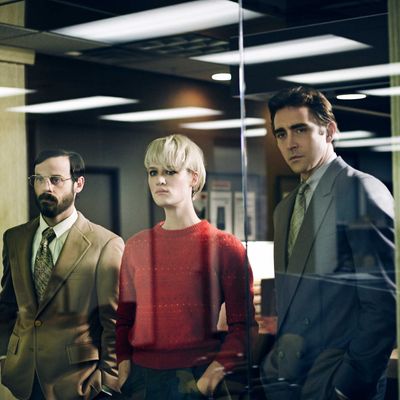
Kudos to Halt and Catch Fire for telling an original story, but I wish it would tell it in a more original way. Set in 1983 in North Texas, which at the time was on the verge of becoming a wholly owned subsidiary of Texas Instruments, this AMC series from Christopher Cantwell and Christopher C. Rogers is a cable drama with no genre hooks. Although there’s a fair bit of intrigue and some thriller-ish atmosphere, Halt has no violent crime element (not yet, anyway), no monsters or supernatural creatures or commando squads, just fictionalized yet still plausible historical details and lots of swagger.
The only things it has in common with Mad Men, the series whose time slot it will occupy beginning this Sunday, are an arrogant, mysterious but brilliant hero and a period setting, but those are pretty significant features, so a superficial comparison isn’t out of bounds. Mad Men used the world of mid-century New York advertising to construct a series of metaphors for the construction of national and personal identity, and on the basis of the pilot (the only episode AMC sent out), Halt seems poised to try something similar in the world of (mostly) pre-internet computer technology.
The problem is, once you get past the initial shock of a fresh premise and start watching the pilot, the show starts to seem more formulaic, with stock characters (mostly female, alas) and what sounds like placeholder dialogue that was supposed to filled in with good stuff later but wasn’t. A lot of consists of barked declarations — characters telling other characters how it’s gonna be, as if they’re in a late-’80s Michael Douglas movie, a vibe they might actually be going for on purpose. “You got East Coast corporate written all over you, and I don’t like East Coast corporate,” a Cardiff Electric executive (Toby Huss) tells our hero, Joe MacMillan (Lee Pace), a former IBM salesman who’s sauntered into his stagnating Dallas-area company with audacious plans to increase its market share. Joe has a bit of the snake oil salesman about him. He’s a handsome jerk whose dark sunglasses and tailored suits and shirts make him look a little bit like a sci-fi Man in Black, and his dialogue is so heavy on fortune-cookie aphorisms and you-can-do-it exhortations that at one point another character flat-out asks him to stop selling for a minute. But as it turns out, Joe is a true believer, and he has a vision: to reverse-engineer the dominant personal computer made by IBM and create an even better one that Cardiff can sell, giving Big Blue its first serious competition in a market it figured it had locked up for all time.
This isn’t a bad start for an underdogs-make-good story, notwithstanding the fact that Mike Judge (who, like Halt’s co-creator Rogers, grew up in the ‘80s in Texas) is currently basking in the success of his own high-tech story, the present-day comedy Silicon Valley. And I like the chemistry between Joe and his designated partner and science genius, Gordon Clark (Scoot McNairy), a Cardiff employee who introduced his own version of the sort of machine Joe wants to make a year earlier, only to see it go down in flames in the marketplace. As played by McNairy, Gordon is an early Walter White type, all smoldering resentment and milquetoast regret, drinking to excess and standing off in corners of his own house like a ghost; the character might seem too much of a cutout sad sack if McNairy didn’t invest him with such broken poignance, and if the show didn’t treat his distress as emblematic of something larger: the built-in limitations of America’s anyone-can-do-it ethos.
Too bad the women don’t have Gordon’s singular energy. The third leg of the central heroic trio, Mackenzie Davis’s Cameron Howe, has an intriguing edge of outsider anger — even though she’s a kind of genius, she refuses to participate in the corporate mainstream, instead spending all day at video arcades and repairing VCRs for $3.25 an hour — but the details of her character don’t seem very plausible. She seems more like a tech geek’s fantasy of a strong woman in the computer industry, or perhaps a mid-’90s Hollywood fantasy of a female hacker, than an actual person: She’s a skinny, beautiful blonde with a Mary Stuart Masterson hairdo, a hot temper, no visible support network of friends (male or female), and an appetite for casual sex. The pilot’s opening scene is so awful that some viewers may not stay tuned for the rest: Joe and Cameron meet hostile-cute and end up having lip-gnawing, wall-pounding backroom sex immediately. Gordon’s wife, Donna (Kerry Bishé), a computer technician who was once her husband’s scientific as well as life partner, fares no better: She starts out a wet blanket griping about his drinking and domestic alienation (deservedly), and by the end she’s Adrian to his Rocky, telling him he can follow his dream as long as he doesn’t neglect his home life.
Although certain early signs are troublesome, AMC’s unwillingness or inability to send out more than one episode means you should take this review with a rather large grain of salt. I don’t know where this show might go, what it’ll do for AMC, or anything else. I do know that I’ll keep watching for McNairy’s performance, for the ‘80s pop hits and Paul Haslinger’s period-perfect synthesizer score, and for the production design touches, which include an early-’80s Dr Pepper can and some of the ugliest shirts and sport coats I’ve seen outside of my own middle school yearbook.


